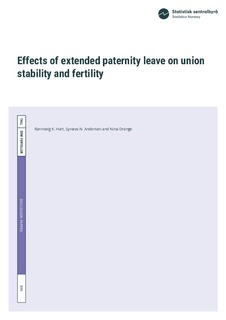| dc.description.abstract | Long paternity leaves have the potential for lasting effects on parental unions, potentially reducing specialization and increasing union stability and fertility.
We put these hypotheses to a causal test, using an extension of the Norwegian parental leave father's quota from 6 to 10 weeks as a source of exogenous variation in fathers' leave uptake. We implement a Regression Discontinuity design, using full population data from Norwegian administrative registers of parents of children in a four-month window around the reform (N = 9 757). The reform significantly increased the amount of leave taken by fathers by about three weeks and reduced the amount of leave taken by mothers. Neither union stability, fertility nor his or her subsequent earnings were affected by the reform. | nb_NO |
